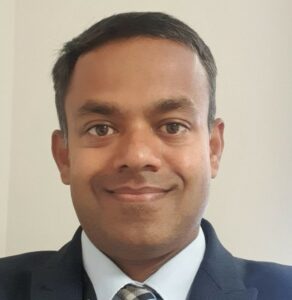Meet Umesh Basavaraju
Umesh is a Consultant Gastroenterologist appointed in 2015 at Aberdeen Royal Infirmary. He is a council member of the Scottish Society of Gastroenterology and the Scottish Lead for the BSG Endoscopy Quality Improvement Programme (EQIP). He successfully completed his PhD in 2012 from the University of Aberdeen and is actively involved in clinical research in the area of HPB endoscopy (EUS and ERCP), Bowel Screening and IBD.
What attracted you to a career in gastroenterology/hepatology?
I graduated from Bangalore Medical College in South India in 2000 and moved to the United Kingdom in 2002 for further post-graduate training with an aim to obtain the highly respected MRCP UK diploma membership. During my core medical training years, I was intrigued by the demographic variation in the prevalence of Inflammatory Bowel Disease and Colorectal Cancer, with the western world having a higher prevalence of these conditions compared to the Indian sub-continent. Hence, I developed a research interest in the field of Inflammation and Colorectal Neoplasia and was looking for a PhD fellowship in this interesting research area.
When exploring my options, I became aware of the excellent research in the area of inflammation and gastrointestinal malignancies being done by Professor Emad El-Omar and his team at the University of Aberdeen and Aberdeen Royal Infirmary in Scotland. I was inspired by Professor El-Omar’s dedication and enthusiasm in this field and was attracted to pursue a career in Gastroenterology. I successfully applied for a PhD fellowship opportunity in his lab, and successfully completed my PhD from the University of Aberdeen in 2012 and then obtained a Gastroenterology Specialist training number in the North of Scotland Deanery.
My other inspiration to pursue a career in advanced endoscopy was Dr Nageshwar Reddy, Chairman of the Asian Institute of Gastroenterology (AIG) in Hyderabad, India, who has dedicated his life to endoscopy. I was fortunate to do an advanced endoscopy fellowship at AIG under his mentorship and after completion of my CCT, I took up a Consultant post at Aberdeen Royal Infirmary with special interests in IBD and Advanced Endoscopy (EUS, ERCP and Bowel Cancer screening).
What advancement in gastroenterology/hepatology are you most excited about and why?
Having a special interest in advanced endoscopy, I am very excited about the emerging technology of Artificial Intelligence (AI) in this field. If we approach AI as a complementary technology, rather than competing technology, it could be applied in the field of endoscopy/gastroenterology for better patient outcomes. The other exciting development is the role of EUS guided Radiofrequency Ablation (RFA) for pancreatic cancer.
What do you enjoy most about your work?
The multidisciplinary nature of my work is most enjoyable. With my special interests, I work with colleagues across various specialities like surgery, radiologists, anaesthetists, dieticians, oncologists, specialist nurses, pharmacists to name a few. Every day at work is enjoyable and when you are having difficult days, you have your team to share your good and bad experiences. During the COVID-19 pandemic, this has been a great source of support for everyone.
What is the one thing you would change?
I am very passionate about the developments in endoscopy, especially the emerging technologies which will help patients, mainly in the field of diagnosis and treatment of gastro-intestinal malignancies. Whilst this development is important and exciting, the way the NHS financing of endoscopy equipment is set up, it is very difficult for clinicians to bring these advancements to apply for routine patient care. My colleagues would also agree that this is very frustrating and hence I wish this could change. The NHS should adapt well in this area and should have a separate funding stream so that these technologies could be readily applied for better patient outcomes in a timely manner. I have been lucky to develop many cancer-related endoscopy services through funding from cancer charities, but it would be helpful if the NHS relies less upon this type of funding.
What’s the best advice you’ve been given in your career?
Throughout my career, I have been fortunate to have very supportive research and clinical mentors who have guided and supported me to develop into an effective clinician with active research interests. Advice by my mentors (Prof Emad El-Omar, Dr Alastair McKinlay and Dr Nageshwar Reddy) to be inquisitive, dedicated and a good team player have been invaluable.
What does being a BSG member mean to you?
I have been a BSG member since 2008 and it has been one of the great decisions I have made in my career. As a trainee, having access to all the educational resources through BSG membership helped significantly during my Gastroenterology specialist training. Initiatives like the BSG trainee advanced endoscopy fellowships and the Young Clinician Programme (YCP), which I was fortunate to be awarded, were a great opportunity to meet and interact with International trainees and Consultants. Being a BSG member gives you the opportunity to get involved in various sections and committees and to contribute to the field of education and research. Attending the BSG Annual meeting as a BSG member over the years helps to learn, develop networks and lifelong friendships. During the COVID-19 pandemic, the BSG has been very proactive and produced guidelines in a timely manner which has helped patients and clinicians.
If you are interested in taking part in our Meet our Members initiative, please contact the BSG Communications team.
